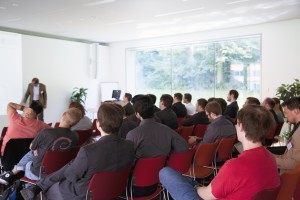 On a sunny Monday in September, the sound of rolling suitcases fills the hallways of the Salzburg University of Applied Sciences. National and international experts collect their name tags with suitcases in their hands, while some of the last rays of the autumn sun hit the glass front of the auditorium. The screen is slowly lighting up with the first introductory slides and the coffee dispenser is ready to be worn out in the upcoming two days.
On a sunny Monday in September, the sound of rolling suitcases fills the hallways of the Salzburg University of Applied Sciences. National and international experts collect their name tags with suitcases in their hands, while some of the last rays of the autumn sun hit the glass front of the auditorium. The screen is slowly lighting up with the first introductory slides and the coffee dispenser is ready to be worn out in the upcoming two days.
It is the beginning of the Workshop on Privacy Enhancing Technologies and Security Solutions for the Smart Grid User Domain, or PRETSELS for short. Despite the catchy acronym, neither the speakers nor the visitors will gain any caloric value from pretzels at this event, but instead feed on the invaluable source of knowledge which is their combined experience in the subject area. Zekeriya Erkin from the Delft University of Technology, together with Dominik Engel and Andreas Unterweger from the Josef Ressel Center for User-Centric Smart Grid Privacy, Security and Control, summoned renowned experts from both, industry and academia, to present and discuss the state of the art of smart grid privacy and security.
Theory meets practice and practice meets theory — under this motto, a perfect mix of theoreticians and practicians allows for an invaluable exchange between the two. Cryptographers explain sophictiated protocols to distribution system operators who elaborate on their requirements, issues and model regions. Everyone learns something new, while contributing to the big picture with their own expertise. All relevant aspects of smart grid privacy and security are analyzed, discussed and — sometimes — put into question. Proposals for joint publications and research projects flow as easily as the never-ending supply of coffee.
With the sun long gone and only street lights illuminating the city of Salzburg, the participants are continuing their discussions at the social event. The view on the city of Salzburg from the restaurant on the sixth floor in the city center is superb. Despite the lack of pretzels at PRETSELS, everyone is having a good time. Steaks and wine seem to be worthy substitutes for the respected participants who quench their thirst for not only knowledge.
As the streets clear, the tables in the restaurant clear as well. Rolling suitcases can be heard again, but much more silently than before. The experts tread on the carpet floor towards the exit. They need to rest so that they can continue their exchange in the morning at the PRETSELS workshop. Another sunny day awaits them.
Author Archives: andreas
Journal paper: Compression algorithm for smart meter data
Smart meters transmit energy consumption and other data to the energy provider. This data needs to be stored for billing and other purposes. Although the amount of data per day and smart meter may not be very large, the opposite is true for thousands of smart meters over extended periods of time. Apart from its storage requirements, this data also needs to be transmitted from the consumer to the energy provider, consuming significant portions of bandwidth. To reduce both, the transmission and the storage requirements, we propose a compression algorithm for smart meter data which reduces its size by about a factor of ten compared to existing, uncompressed encodings. In addition, the design of our approach makes resuming communication after transmission errors easy due to the low communication overhead.
-
![[PDF]](https://www.en-trust.at/wp-content/plugins/papercite/img/pdf.png)
![[DOI]](https://www.en-trust.at/wp-content/plugins/papercite/img/external.png) A. Unterweger and D. Engel, “Resumable Load Data Compression in Smart Grids,” IEEE Transactions on Smart Grid, vol. 6, iss. 2, p. 919–929, 2015.
A. Unterweger and D. Engel, “Resumable Load Data Compression in Smart Grids,” IEEE Transactions on Smart Grid, vol. 6, iss. 2, p. 919–929, 2015.
[Bibtex]@Article{Unterweger15a, author = {Andreas Unterweger and Dominik Engel}, title = {Resumable Load Data Compression in Smart Grids}, journal = {IEEE Transactions on Smart Grid}, year = {2015}, volume = {6}, number = {2}, pages = {919--929}, month = {March}, doi = {10.1109/TSG.2014.2364686}, pdf = {http://www.en-trust.at/papers/Unterweger15a.pdf}, publisher = {{IEEE}}, url = {http://dx.doi.org/10.1109/TSG.2014.2364686}, }